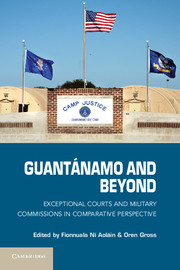Book contents
- Frontmatter
- Contents
- Contributors
- Acknowledgments
- Introduction: Guantánamo and Beyond
- Part I Military Commissions and Exceptional Courts in the United States
- Part II Exceptional Courts and Military Commissions Elsewhere
- Part III International Law, Exceptional Courts, and Military Commissions
- 14 The Right to a Fair Trial in an Extraordinary Court
- 15 Approaches and Responses of the UN Human Rights Mechanisms to Exceptional Courts and Military Commissions
- 16 Exceptional Courts and the European Convention on Human Rights
- 17 The Legitimacy Deficit of Exceptional International Criminal Jurisdiction
- Index
- References
16 - Exceptional Courts and the European Convention on Human Rights
Published online by Cambridge University Press: 05 June 2014
- Frontmatter
- Contents
- Contributors
- Acknowledgments
- Introduction: Guantánamo and Beyond
- Part I Military Commissions and Exceptional Courts in the United States
- Part II Exceptional Courts and Military Commissions Elsewhere
- Part III International Law, Exceptional Courts, and Military Commissions
- 14 The Right to a Fair Trial in an Extraordinary Court
- 15 Approaches and Responses of the UN Human Rights Mechanisms to Exceptional Courts and Military Commissions
- 16 Exceptional Courts and the European Convention on Human Rights
- 17 The Legitimacy Deficit of Exceptional International Criminal Jurisdiction
- Index
- References
Summary
WHAT IS A COURT OF EXCEPTIONAL, SPECIAL, OR EXTRAordinary jurisdiction, and how can it be distinguished from a normal or regular court, or one with merely a particular or specific jurisdiction? Answering these questions in the context of contemporary Europe is complicated by the fact that, in spite of the homogenization of public institutions since the end of the Cold War, various legal traditions continue to flourish. As a result, there is no uniform structural or procedural model of a normal court against which those with particular, special, exceptional, or extraordinary jurisdiction might easily be compared. Furthermore, although the specialization of professional functions, an inherent feature of modernity, has ramifications for European and other modern legal processes, the emergence of tribunals with specific jurisdiction – over, for example, family, juvenile, maritime, election, commercial, immigration, military, employment, and antiterrorist matters – is not just a recent or one-way trend. Courts with special, extraordinary, or specific jurisdiction were also a feature of premodern Europe. Some tribunals, such as ecclesiastical courts, have also either disappeared or greatly diminished in significance as the “contemporary European institutional model” has become both deeply and widely institutionalized.
- Type
- Chapter
- Information
- Guantánamo and BeyondExceptional Courts and Military Commissions in Comparative Perspective, pp. 341 - 360Publisher: Cambridge University PressPrint publication year: 2013



